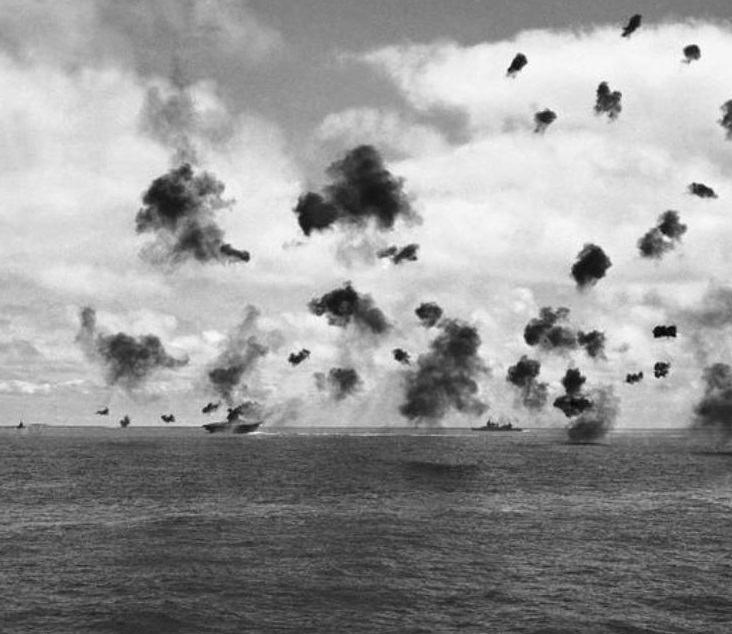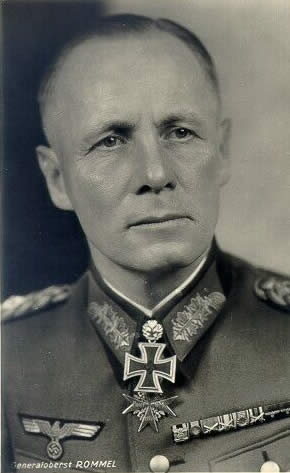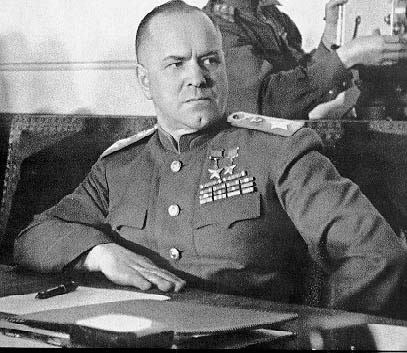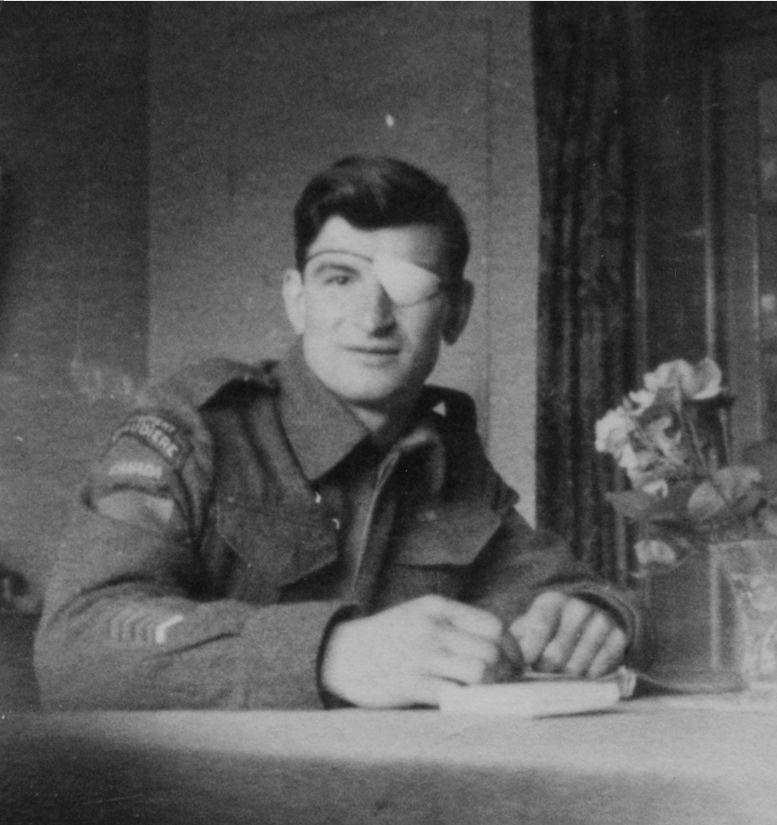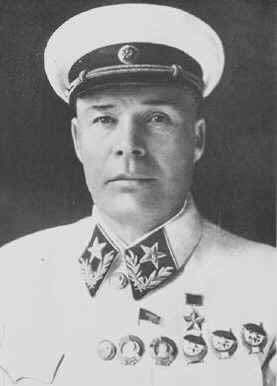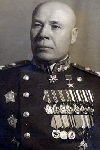Along the Battle Fronts
by Our Military Critic, Maj.-Gen. Sir Charles Gwynn, K.C.B, D.S.O.
The War Illustrated, Volume 6, No. 135, Page 130-131, August 21, 1942.
Readers are asked to remember that the articles on the War by Land, Sea and Air, specially written for THE WAR ILLUSTRATED by our expert contributors, should be read with at least a fortnight's perspective in mind. Of necessity these articles are written between two and three weeks in advance of publishing day and no attempt can be made in a fortnightly publication to be abreast of the latest news. The aim of our contributors is to present a well-considered view of the progress of the War from all points of view at the time of writing.
During the second half of July the situation continued to deteriorate at a disturbing pace. It is true that the lull in the Far East might be considered advantageous to the Allies, as it gave time for expansion and organization of their forces. The limited success of Japanese operations in China and spirited resistance of the Chinese armies were also encouraging. But the losses inflicted on Japan's shipping and navy in the period were probably more than balanced by the quantities of raw material for war purposes from captured territories.
In Egypt, Gen. Auchinleck had ensured, temporarily at least, the security of Alexandria and the Canal, and had achieved some minor tactical successes; but he had been unable to muster an adequate force in time to attempt a decisive blow against Rommel's army while it was still exhausted, and without reinforcements or an organized line of communications. The situation became one of temporary stalemate, neither side being strong enough to attempt a major offensive on a restricted front which denies possibilities of large-scale manoeuvre and involves frontal attacks on strongly defended positions. By pursuing an active policy, General Auchinleck may be able to slow down the rate at which Rommel can gather strength for a renewed attempt to reach Alexandria, while at the same time gaining time for accessions to his own strength to arrive from distant sources.
While conducting that policy he would have the advantage of better and shorter communications to his immediate base, and his troops should consequently suffer less than the enemy from exposure to summer conditions. On the whole, the situation in Egypt has deteriorated only so far as hopes of an early and effective counter-offensive have had to be abandoned, leaving the threat to Alexandria in abeyance.
In Russia the deterioration of the situation was, of course, so far as ascertainable facts go, much more serious. Russia by the end of the month had lost the industrial area of the Donetz, the great food-producing areas in the bend of the Don, and her oil supplied were threatened.
The left wing of Timoshenko's armies on the Lower Don had been defeated after hard fighting; its losses must have been heavy, and there was little hope of it being strongly reinforced. Its residual power of resistance depended on the degree of success achieved in carrying out a difficult withdrawal and on the strength of reserves in the Lower Don region still unused. The threat to Stalingrad and to the Volga waterway had also become very serious, but the possibility of reinforcing the defences there made the situation a degree less critical than on the left of Timoshenko's front.
The successful counter-attacks at Voronezh alone of the ascertainable facts are encouraging. There are, however, factors in the situation about which definite information cannot be obtained, but which may yet vitally affect the development of the situation favourably.
The Germans have achieved success by a maximum concentration of their offensive strength. The question is, how long can the momentum of their offensive bee maintained, and to what extent has the resistance it has encountered exhausted it strength? We do not know and can speculate only.
Russia, on the other hand, although she has lost so heavily in territory and in sources of war production, has still a great part of her army uncommitted. She has no occupied territories to garrison, and, except for the army she maintains in the Far East, she is free to use all of her reserve power. What its strength may be we have no exact knowledge, but it probably exceeds the strength of Germany. If the part of her army which had has to meet the German blow retains sufficient strength to continue its resistance, an opportunity may arise for the employment of this reserve strength in counter-offensive action. Even if a counter-offensive were unable to make headway against stubborn German defence it might at least prolong the struggle into winter.
Egypt
In Egypt after the indecisive tank battle of July 15 and 16 there was a lull broken only by intensive air attacks on Rommel's troops and communications. The lull continued until the night of the 21st, when Auchinleck launched an attack on his whole front. His chief objectives were to extend his hold on the ridges about Tel el Eisa in the north, the capture of Ruweisat ridge in the centre, and to improve his position on the plateau bounding the Qattara depression in the south. Progress was made at all points, and in particular the whole of the Ruweisat ridge was captured. Throughout the 22nd Rommel counter-attacked strongly, but without again committing any large force of tanks. He recovered the western extremity of the Ruweisat ridge, where counter-attacks had been most violent, and the Tel el Eisa ridges changed hands several times. Thus our final gain of ground was inconsiderable.
On the whole, the results of the attack were somewhat disappointing, but it did, to some extent, improve the position, and inflicted losses on the enemy which effectively slowed down the recovery of his offensive strength.
There followed a lull of four days, during which the enemy worked at consolidating his position, now well protected by minefields. Only July 28 Auchinleck attacked again in the northern sector to secure a further footing on the Tel el Eisa ridges. Several points were taken, but could not be held, as the rocky ground prevented rapid consolidation and troops were exposed to great concentration of artillery fire. Isolated high points, though valuable for observation purposes, can seldom be held unless defences can be consolidated well beyond them, for they are inviting targets. In this instance minefields prevented tanks from gaining ground which the infantry might have consolidated. As a raid the operation had some success, but on the whole it was disappointing. The lull which followed it proved that nothing of importance had been achieved.
Russia
In the latter half of July the great German drive southwards progressed alarmingly. West of the Donetz it was stubbornly resisted, but it was pressed there by an immense concentration of aircraft, tanks and guns.
The first sign that Timoshenko had little hope of checking the drive short of Rostov was when the great industrial town of Voroshilovgrad was evacuated on July 19. Rearguard fighting continued, but by the 24th fighting was going on in the outskirts of Rostov and tanks had penetrated the outer defences.It was then only a question whether Timoshenko would sacrifice troops to fight for every house, or whether he would try to get as many as possible to the other side of the Don. Wisely he took the latter course, and though his troops from the right bank were probably much disorganized in crossing the river under constant attack, a substantial proportion must have got away safely since the Germans claimed no large number of prisoners.
Although the capture of Rostov was a sensational event it had probably no special strategic importance, for the city had lost much of its value to the Russians and its fall did not greatly facilitate further German operations. Like the Donetz Basin it was a loss that had to be written off. The main problem was how to check the impetus of the German drive on the line of the Don.
The Germans had reached the river on a broad front, and their attempt to cross it at Tsimlyanskaya, halfway between Rostov and its great bend, was particularly dangerous, for the Stalingrad-Novorossisk railway passes within forty miles of this point -and this line was the only remaining railway communication with Timoshenko's left flank. Tsimlyanskaya, however, probably marked the centre of the army which had retreated in good order southwards between the Don and Donetz, and the German attempts to cross the river failed a number of times in the face of strong opposition before a bridgehead was established. Even when a firm foothold had been gained, its reinforcement was difficult, and counter-attacks had, up to the end of the month, checked its extension, compelling the Germans to attempt crossing at other points.
As had been illustrated at Voronez it is often easier to effect the crossing of a river than to deploy a force of offensive capacity across it. Vigorous and quick counter-attacks are therefore the main method of holding a river line, although air attacks may greatly add to the difficulty of reinforcing bridgeheads. Although by the end of July the Don had been crossed at several points, the problem of deploying the German Army on its left bank had not yet been solved except for the Rostov region.
Meanwhile the left wing of the German drive had neared the elbow of the Don, close to the Volga and Stalingrad. It was meeting strong opposition on the right bank of the river, and had as yet made no attempt to force a crossing. Probably from lack of good communications the German force here was not at first of great strength, but the advance in the Donetz, by securing control of the railway to Stalingrad, may have enabled it to be reinforced. The attack therefore promised to grow in violence.
What the crossing of the Don would eventually cost the Germans, and what its effect in checking the momentum of their advance would be, were at the end of the month uncertain. It was also becoming doubtful whether they would be able to retain their footing across the river at Voronezh. They had not limited reserves to draw on in this region, for Russian attacks at Bryansk were threatening the northern defensive flank of their great offensive. The subsidiary offense which they had opened in the Rzhev region had died down, possibly because the reserves were needed at Bryansk, and there was an obvious danger that this would leave Zhukov with a freer hand to use his reserves offensively.
Serious as the Russian situation was, it certainly still had encouraging possibilities.
Previous and next article from The Battle Fronts
Along the Battle Fronts
In the third week of July the general situation had become grave and alarming. Germany's 1942 offensive had developed in even greater strength than was expected. Although it had been evident that du
The Battle Fronts
On May 6, 1943, the battle of Tunisia was decisively won by a blitzkrieg attack following on a series of desperate encounters in which the enemy's troops were exhausted and his reserves expended. The
Index
Previous article
Next article
The Home Front
"Is that a utility suit?" demanded an Hon. Member of the President of the Board of Trade the other day when the Commons were discussing the annual "Vote." "No, sir," replied Mr. Dalton, "because I am


